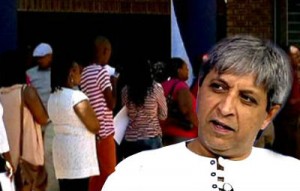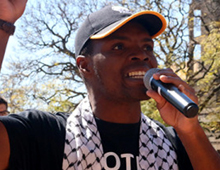Precious Mamotingoe Lesupi
Many parents are unable to meet the high costs of education from their household budgets. So support from schemes such as the National Student Financial Aid Scheme (NSFAS) provides a lifeline to families across the nation. But there has been much turmoil around the implementation of the scheme.
The University of the Free State’s tuition fees are 23 to 38% lower than that of other tertiary institutions, according to research done by Moneyweb.

Pan African Student Movement of Azania (PASMA) leaders call for continued protests as almost 1 000 students look on. Photo: Nombulelo Damba West Cape News
A Bachelor of Arts (BA) degree costs roughly R18 780, while a Bachelor of Science (BSc) costs about R23 690. This may not seem exorbitant but it is still not affordable to many students. This is why financial aid schemes such as the government-funded National Student Financial Aid Scheme (NSFAS) are so important.
NSFAS has been the source of turmoil in many institutions of higher learning across the country, even though funds allocated to universities have increased from R2.5-billion in 2008 to R9.5-billion in 2014.
Speaking at a press conference recently, the University of Witswatersrand’s Student Representative Council (SRC) President, Mcebo Dlamini, expressed frustration at the manner in which the NSFAS issue was being handled.
“We are caught in the middle between NSFAS and the university. The university is saying it’s NSFAS. NSFAS is saying it’s the university, and we are in the middle. Those who are rich are going to class while those who are poor don’t know whether they have a future at this prestigious university…”
The latest protests have been triggered by the decision to charge students awaiting NSFAS approval a registration fee of R4 670.
Frustrated students across the country have taken to protesting, with chaos erupting at institutions like the Tshwane University of Technology (TUT) where classes have been suspended. At the Cape Peninsula University of Technology students used pepper spray to keep others out of class.
Dlamini said the obstacles related to NSFAS were repeated each year and led to conflict.
Despite the frustration, the Wits SRC under Dlamini launched a successful campaign a few weeks ago to raise R1-million to help fellow students so that they can register. The effort, widely praised, has assisted about 2 000 students.
But the NSFAS issue remains.
Ntakuseni Razwiedani, a UFS post-graduate student, suggested the answer was free education. He said the money could be raised from large corporations and a tax imposed on high income earners. He said the NSFAS budget was insufficient to cover all needy students.
According to Razwiedani, the issue of education needed political will.
“Of course government is trying but it’s not doing its best in terms of what it can do, because I mean if we’re speaking of the education tax for example, it’s something that must be introduced by government. So if that’s an option for government to do away with fees in institutions of higher education and learning and it’s not doing it, it means within the ANC led government there is a lack of political will to deliver free education.”

Adam Habib
Professor Adam Habib, the Vice-Chancellor of Wits University, also alluded to the interference of political parties in the issue of NSFAS. Speaking at a press conference recently he said:
“I think that we need a serious conversation in our society about how we finance higher education in this country… I think it’s really tragic that political parties will take what is essentially a high need and try to score cheap political points out of it. This does not allow for a deliberated conversation in the society. It doesn’t allow us to have a serious conversation without any of the emotions attached.”
UFS academic Dr Kelebogile Choice Makhetha, the Vice-Rector for External Relations at the University of the Free State weighed in on the issue. She said the government could budget for education as if it were a priority, but the manner in which these funds were spent undermined the priority status. She mentioned a meeting that was attended by the minister of Higher Education, representatives from institutions of higher learning across the country and the NSFAS CEO where solutions could not be tabled.
“Even there at the meeting with the minister there were no solutions – even about the students who qualified for NSFAS who were in the system and were not funded last year to say now what do we do this year. All universities together with the minister and the CEO of NSFAS could not come with a solution. So each university is coming up with ways to save its students because they’re already in their second year, third year and are about to finish.”
Dr Makhetha said the business sector had to be involved more to raise funds for financial aid for students. “I think we have not explored bringing the business sector into play, because a lot of companies would ask ‘how can we assist?’ and even with bursaries because most of them have not been approached and there’s more that we can do… If most of the companies listed on the JSE were funding education the challenge would be lighter.”
When asked about the feasibility of an education tax which would allow for free higher education, Dr Makhetha responded by saying:
“It’s easy to talk about tax. Already businesses are being taxed heavily and you take load shedding now as one piece that is affecting the economy, that businesses will not be making as much money as they have been making because of load shedding. And we’re talking three years ahead of us. It’s more like an eco-system. If you touch this, it affects that.”
She said overall our society needed to put more value on education. How a society spent its money was an indication of what it valued.
“If you check a society and how we spend, on what we spend our money on, at times it’s those things we can do without and actually contribute. People go to clubs and restaurants and spend R4 000, R5 000 a night. If a person was to put such money into a fund that goes towards education it would make a difference. But I think we have not gotten to a point where we are conscious about the challenge that is there for education.”











I appreciate, cause I found exactly what I was looking for. You’ve ended my four day long hunt! God Bless you man. Have a great day. Bye
Howdy, I believe your website might be having browser
compatibility problems. When I take a look at your site in Safari,
it looks fine however when opening in IE, it’s got some overlapping issues.
I just wanted to provide you with a quick heads up!
Besides that, fantastic site!
Magnificent goods from you, man. I have bear in mind your stuff
prior to and you are just extremely excellent. I really like what you’ve obtained right here, certainly like
what you are stating and the best way during which
you assert it. You are making it enjoyable and you continue
to care for to stay it sensible. I can’t wait to learn far more from you.
That is really a wonderful website.
Currently it seems like Expression Engine is the top blogging platform out
there right now. (from what I’ve read) Is that what you are using on your blog?
Thank you for the auspicious writeup. It in fact was a
amusement account it. Look advanced to more added agreeable from
you! However, how could we communicate?
Ahaa, its good discussion concerning this post at this place at this webpage,
I have read all that, so now me also commenting here.
Nice respond in return of this matter with firm arguments and describing all
concerning that.
It’s genuinely very complex in this full of activity life to listen news on TV, thus I only use web for
that reason, and get the hottest news.
Thanks on your marvelous posting! I genuinely
enjoyed reading it, you might be a great author.I will make sure
to bookmark your blog and will eventually come back later in life.
I want to encourage continue your great job, have
a nice weekend!
Ahaa, its pleasant discussion about this article here at this webpage,
I have read all that, so now me also commenting at
this place.
Hi there i am kavin, its my first occasion to
commenting anyplace, when i read this piece of writing i thought i could also create comment due to this good post.
It’s a shame you don’t have a donate button! I’d definitely donate to this outstanding blog!
I guess for now i’ll settle for book-marking and
adding your RSS feed to my Google account. I look forward to fresh updates and will talk about this website with my Facebook group.
Talk soon!
Usually I don’t read post on blogs, however I wish to say that this write-up very
forced me to take a look at and do so! Your writing taste has
been surprised me. Thanks, very nice post.
Excellent post. I will be experiencing many of these issues as well..
What’s up Dear, are you in fact visiting this website on a regular basis,
if so afterward you will without doubt get good
knowledge.
Hello! I know this is kinda off topic but I was wondering
if you knew where I could find a captcha plugin for my comment form?
I’m using the same blog platform as yours and I’m having difficulty finding one?
Thanks a lot!
Your method of telling all in this paragraph is really good, all can without difficulty be aware
of it, Thanks a lot.
You are so interesting! I don’t think I’ve truly read a single thing like this before.
So good to discover someone with some original thoughts on this issue.
Really.. thanks for starting this up. This web site is something that’s needed on the web,
someone with a bit of originality!
Great blog here! Also your website loads up fast! What web host are you using?
Can I get your affiliate link to your host? I wish my
site loaded up as fast as yours lol
James Jernigan’s YouTube channel is a comprehensive resource for AI marketing enthusiasts. His content is not only informative but also engaging, making it an enjoyable learning experience for all.
I couldn’t refrain from commenting. Well written!
Heya i am for the first time here. I came across this board and I in finding It truly useful & it helped me out a lot.
I’m hoping to provide something again and aid others such
as you aided me.
Hi there i am kavin, its my first time to commenting anyplace, when i read
this article i thought i could also make comment
due to this sensible piece of writing.
If some one wants expert view concerning blogging and site-building after that i propose him/her to pay a visit this
webpage, Keep up the pleasant work.
I am now not sure where you’re getting your information, but great topic.
I must spend some time finding out more or
working out more. Thanks for magnificent information I used to be looking for this
information for my mission.
Howdy! I could have sworn I’ve been to this blog before but after reading through some of the
post I realized it’s new to me. Anyhow, I’m definitely happy I found it
and I’ll be bookmarking and checking back often!
Thanks for sharing your thoughts on Hair
growth stimulants. Regards
It’s impressive that you are getting thoughts from
this piece of writing as well as from our dialogue made at this place.
It’s awesome to pay a quick visit this website
and reading the views of all mates concerning this piece of writing, while I
am also eager of getting know-how.
I always spent my half an hour to read this weblog’s articles
or reviews everyday along with a cup of coffee.
What’s up mates, how is everything, and what you wish for to say regarding this article,
in my view its genuinely remarkable for me.
That is really interesting, You are an overly professional blogger.
I’ve joined your feed and look forward to in quest of more of your excellent post.
Also, I’ve shared your site in my social networks
I am curious to find out what blog system you happen to
be utilizing? I’m experiencing some small security issues with my latest website and I’d like to find something more secure.
Do you have any recommendations?
Hello, just wanted to mention, I liked this post.
It was funny. Keep on posting!
free adult live chat, cum chat on real webcam platform and watch live cam girls. We also have shemales, shemales and couples for live sex.
If you have ever felt poorly with an Meet New People on Live Chat, then you might have had the experience where your body feelings and emotions made you see the world in
Although there may be misconceptions about escorts, it is important to understand that escorts provide a safe and secure service to their clients Mahipalpur Call Girls Service ||
In this essay, we will discuss why escorts service provides a safe and secure option for those seeking companionship. Escorts in Dehradun ||
First and foremost, escorts service carefully screens their escorts to ensure they are trustworthy and reliable. Escorts in Goa ||
Escorts agencies conduct background checks and interviews to verify the identity and character of their escorts. South Delhi Escort Service ||
Some people think that call girls services are very expensive, but did you know that there are call girls services available at cheap rates? Goa Call Girls Service ||
Yes, you heard that right! There are call girls services that can fulfill your dreams without breaking the bank. Call Girls Service in Dehradun ||
I like this blog it’s a master piece! Glad I observed
this ohttps://69v.topn google.Raise range